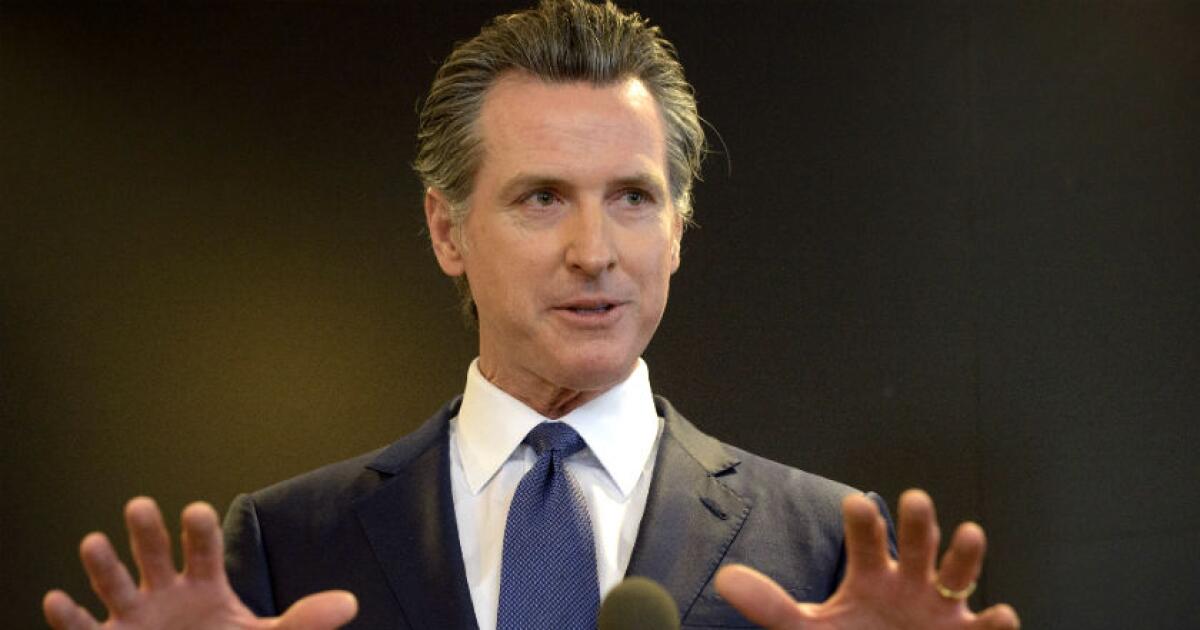Many leading California Democrats have been clamoring to jettison Donald Trump from the state’s election ballot, but Gov. Gavin Newsom has made it clear he is against the move.
“There is no doubt that Donald Trump is a threat to our liberties and even to our democracy,” Newsom said, “but in California, we defeat candidates at the polls. Everything else is a political distraction.”
Newsom’s terse statement on Friday runs counter to the position taken by Lt. Gov. Eleni Kounalakis and nine state lawmakers, who have pushed to remove the former president from the California ballot. The campaign gained momentum this week when the Colorado Supreme Court ruled Trump ineligible for spurring on the Jan. 6, 2021, insurrection at the U.S. Capitol.
Political opinions on Trump’s eligibility ultimately are expected to be of little consequence on a novel question of the law that will almost certainly have to be settled by the U.S. Supreme Court. If the high court agrees to take the case, election law experts said its decision would probably affect primary and general election ballots across the country.
“I think Newsom is showing that — in a state dominated by Democrats, who might easily succumb to their partisan interests — he is being the grown-up in the room,” said Sara Sadhwani, a political science professor at Pomona College and sharp critic of Trump’s attempts to overturn the 2020 election. “We have institutions, the courts, to answer these questions. And political meddling in elections does not lead to stability for our democratic institutions.”
Jessica Levinson, a constitutional law professor at Loyola Law School, predicted that the U.S. Supreme Court will overturn the Colorado court, with the justices probably loath to give the appearance that they are “throwing the 2024 presidential election or putting their thumb on the scale in the 2024 presidential election.”
Levinson said that that does not mean the Colorado high court’s decision was unreasonable, given the 14th Amendment’s provision that individuals could be deemed ineligible for office if, as an “officer of the United States,” they engaged in insurrection or rebellion against the United States or aided its enemies.
As a strict legal question, Levinson said, “if you give aid or comfort to those who engage in insurrection, then you are not eligible for the ballot in my view.”
Trump’s disqualification from the Colorado ballot would not necessarily block him from returning to the presidency. He lost the state by 13 percentage points in 2020 and could find a path to 270 electoral votes without the state’s 10 electoral votes. He also won the presidency in 2016 without California’s huge electoral trove, which now stands at 54.
But the campaign to remove Trump from the ballot is continuing in many other states, provoking charges from the candidate and other Republicans that Democrats are trying to rig the 2024 election.
In the swing state of Michigan, which Trump carried in 2016 and lost in 2020, some voters have sued to keep Trump off the ballot.
Maine Secretary of State Shenna Bellows, a Democrat, is considering arguments from both sides as to Trump’s eligibility for the 2024 ballot.
California has picked Democrats for president in eight consecutive elections since it went for Republican George H.W. Bush in 1988. Trump trails badly in early California polling for the 2024 presidential contest.
But several of the state’s top Democrats have said that Trump should be disqualified from the March primary ballot.
Kounalakis, a Democrat who is running for governor in 2026, wrote to California Secretary of State Shirley Weber, who oversees elections, asking her “to explore every legal option” to keep the former president off the March 5 ballot.
“This decision is about honoring the rule of law in our country and protecting the fundamental pillars of democracy,” Kounalakis wrote, citing the Colorado Supreme Court’s 4-3 decision.
Assemblyman Evan Low, who represents the Silicon Valley, heads a group of nine Democratic legislators who asked state Atty. Gen. Rob Bonta to drop Trump from the ballot. They say the action would force the courts to determine the former president’s eligibility.
“No one is above the law,” Low said in an interview last week, “and the courts should enforce the Constitution. Period. Full stop.”
Jaime Regalado, professor emeritus of political science at Cal State Los Angeles, viewed Newsom’s stand for keeping Trump on the ballot as the governor’s latest gambit to differentiate himself from California’s liberal orthodoxy.
“I think that, at least in part, this is a way to distance himself from the left a little bit and to move a little bit toward the political middle,” said Regalado. “We don’t expect him to be challenging Biden. But at the same time, we expect him to be a candidate soon for national office.”
This story originally appeared on LA Times

